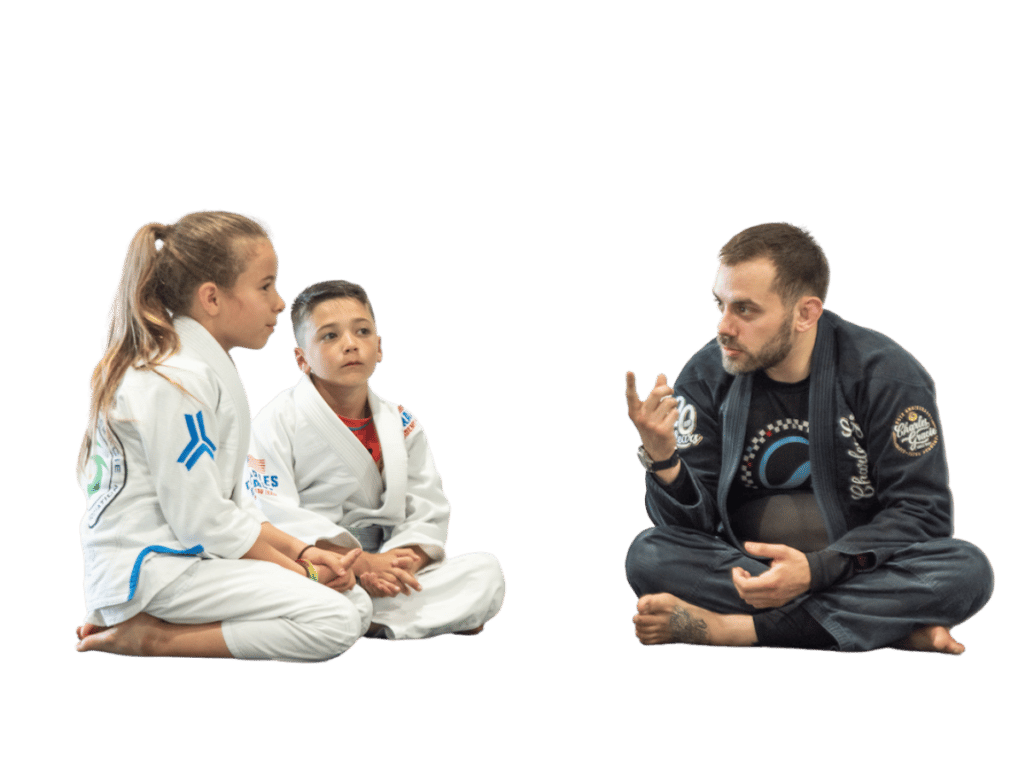Anti bullying
Granite Bay Jiu-Jitsu Anti-Bullying Program
The anti-bullying movement may be stronger, but your child is stronger. While lawmakers and school officials debate how to stop bullying, bullies continue their cruelty.

Let's Become Bully-Proof
Ready to stop bullying? It takes more than words — or sticks and stones. It takes improved confidence, focus, empathy, and self-awareness. And jiu-jitsu cultivates all of those. Plus, it’s an effective form of exercise and bonding. What better way to ward off bullies, make new friends, and forge lasting resilience?
Sign up now and get a free 7-day pass to the Granite Bay Anti-Bullying Jiu-Jitsu Program. In just a week, you or your child can learn invaluable tools and a renewed sense of purpose. Once you train with us, you’ll see what we mean.
Discover the anti-bullying power of jiu-jitsu.
Anti bullying
Parent-tested and kid-approved.
The anti-bullying movement may be stronger, but your child is stronger. While lawmakers and school officials debate how to stop bullying, bullies continue their cruelty.
Ward off bullies. Make sure your kid becomes bully-proof. The Brazilian martial art of jiu-jitsu helps everyone feel confident and capable.
Anti bullying
The Granite Bay Anti Bullying Program
There will always be mean kids, but bullying doesn’t have to be a normal part of childhood. By encouraging our youth to be resilient, we empower them to deal with threatening behavior. The martial arts instill both self-esteem and self-awareness, helping kids defend themselves from bullies and overcome their cruel remarks.
Bullying is never the victim’s fault. But there’s no doubt that confidence and conflict resolution skills help kids deflect bullies.
Zero-tolerance anti-bullying programs are poised for failure. They disproportionately hurt the victim, especially people of color. Also, they do nothing to stoke your kid’s self-esteem or self-resilience. If you’ve heard your school’s anti-bullying talks, you know they’re often limited to “no bullying allowed” rather than offering constructive advice.
The more we stand up to bullies, the better we can stop bullying at the source. Martial arts does more than teach kids how to fight — it shows them their innate power and cultivates a sense of focus, ambition, and creativity.
In the Granite Bay Anti-Bullying Program, we teach Brazilian jiu-jitsu under the guidance of Ryan Rich. He’s a second-degree black belt who trained under jiu-jitsu Master Charles Gracie. With more than 15 years of grappling training, Rich creates a safe, health-minded, and dynamic environment. He draws upon Master Gracie’s innovative methods that emphasize leverage and focus over brute force.
Granite Bay Jiu-Jitsu is certified by:
- IBJJF (International Brazilian Jiu-Jitsu Federation)
- Master Rickson Gracie’s JJGF (Jiu-Jitsu Global Federation)
- Master Robson Gracie’s FJJIO (Jiu-Jitsu Federation of Rio de Janeiro)
How GBJJ Can Help Stop Bullying
The martial arts teach highly refined techniques for defeating an enemy. Jiu-Jitsu is unique in that it does not require extraordinary strength or advanced sparring. Practitioners learn to deflect blows, even from a much bigger, stronger opponent. They may even use their attackers’ strength against them.
The stereotypical “big kid” on the playground is a common bully. They throw their weight around. Most kids don’t feel able to face up to them, let alone fight back. And fighting back could get them in trouble with school officials who misinterpret the conflict.
Martial arts shows kids how to take control of a situation. It’s not about being the bigger kid, it’s about deflecting and de-escalating the threat.
Jiu-jitsu is a time-honored method for tipping the scales. It encourages confidence, focus, and awareness so you or your child can handle bullying threats — and often, prevent them to begin with. Bullies don’t want to mess with someone who could make them look silly!
Here’s what Gracie jiu-jitsu can help you or your kid do:
Develop Confidence
- Ideally, your child never has to use their jiu-jitsu skills against a real-world opponent. It’s all about knowing that they could defend themselves in a fight. That confidence alone works wonders in helping them avoid conflicts.
- Jiu-jitsu training is a great way to increase self-esteem. It’s a dynamic workout that builds strength and body awareness, both of which boost confidence.
- Plus, your kid makes friends and forms partnerships, even as they’re sparring against their classmates. It’s an excellent opportunity for socialization, which helps them feel more confident in their everyday lives.
Situational Awareness
- To ward off a threat, we must be aware of it. There’s nothing like jiu-jitsu for cultivating awareness of one’s situation — from interpreting others’ motives to using their attack against them.
- Jiu-jitsu focuses on self-defense without necessarily striking back (which could lead to punishment under zero-tolerance anti-bullying programs). Students develop laser focus even when they’re in a compromised position. They turn their strength — both mental and physical — into a strategic advantage rather than “fighting.”
- Kids can apply this skill to all aspects of their lives, from safely participating in their extracurriculars to managing their stress during tests, etc. Situational awareness is vital to your child’s well-rounded education
Lifelong Responsibility
- Few activities instill discipline and ambition like martial arts. Jiu-jitsu encourages your child to set goals, govern their emotions, and push themselves to new heights. All of these promote a sense of responsibility. This helps them achieve self-confidence and cultivate healthy relationships.
- And that makes them more bully-proof. The better your child can take ownership of their life, the better they can ward off mean kids. Jiu-jitsu is more than a fun activity — it’s a way of moving, thinking, and creating.
Tarpan Patel
2 weeks ago
Ferrari World in Yas Island, Abu Dhabi, is nothing short of fantastic! An absolute must-visit for not just car enthusiasts, but anyone seeking thrilling rides,...Read More »
Anand Sudhakaran
in the last week
Ferrari world was a great experience. Lot of thrilling rides. adrenaline rushed to its max in roller coaster. The experience was fantastic. Kids really enjoyed....Read More »
Kelsey Jay
a month ago
Super fun day- visiting from Canada. The rides are fast and intense!! Had so much fun. Worth the admission- much cheaper than Disneyland and more...Read More »
Bully-Proof Your Child For Life With Charles Gracie Jiu-Jitsu!
Many have described bullying as an epidemic. It’s true that cruel behavior has increased, especially with the rise of social media. Bullying is an inevitable part of school. And once kids become adults, they’ll continue to face bullies in the workplace.
The best way to stop bullying is to build resilience. When we become bully-proof, we deprive the mean kids of opportunities to be mean. Eventually, they get bored … and the culture changes.
We’ve relied on an eye-for-an-eye, aggressive approach for too long. Gracie Jiu-jitsu doesn’t teach your kid how to hit — it empowers them to defuse conflict and remain aware throughout any situation.
And that helps them become bully-proof for life. They’ll pursue their schooling, social life, and eventual careers with integrity and confidence. Self-defense doesn’t mean “defensive” — it’s a powerful way to build resilience. Bullies come and go, but a bully-proof attitude lasts a lifetime.
It’s all possible with the Granite Bay Jiu-Jitsu Anti-Bullying Program.
Anti-Bullying Lessons We Teach Our Jiu Jitsu Kids
How To Deal With Confrontations
- Society in general teaches kids to either avoid conflict or react to it aggressively. Neither technique helps them protect themselves against bullying. Bullies thrive on conflict, so they can be relentless. Confrontation is inevitable… so our kids must be able to deescalate the situation with a feeling of security.
- Jiu-jitsu teaches your child how to navigate conflict while remaining empowered. At Granite Bay, we use evidence-based methods suitable for every kid. Our approach helps them modulate their behavior and overcome their bullies with confidence.
Be Confident, Not Arrogant
- It’s tough being a kid sometimes. You want them to feel self-assured and capable of reaching their goals. Martial arts teaches both ambition and discipline. They learn how to grow their confidence without succumbing to arrogance.
- In particular, jiu-jitsu helps them tune into their cognition so they can regulate their emotion. This martial art is all about focus and awareness rather than brute strength. As a result, they gain self-esteem while remaining perceptive and self-aware.
Leverage Communication First And How To Do It Well
- Kids can be quite nonverbal, which may be why so many troubled youths turn to aggression. But while the bullies talk with their fists, your child can master communication from a young age. Jiu-jitsu teaches the importance of body language and mastery. In addition to providing a great workout, it gives our kids a chance to turn perception into action — without relying on emotional impulses.
- We co-developed the Granite Bay Anti-Bullying Program with Christine S. Zelnik, M.A., CCC-SLP, a boutique, pediatric speech-language pathologist. She’s helped us turn Charles Gracie’s style of jiu-jitsu into a communicative means of stress relief, conflict de-escalation, and empathy-building.
Let's Become Bully-Proof
Ready to stop bullying? It takes more than words — or sticks and stones. It takes improved confidence, focus, empathy, and self-awareness. And jiu-jitsu cultivates all of those. Plus, it’s an effective form of exercise and bonding. What better way to ward off bullies, make new friends, and forge lasting resilience?
Sign up now and get a free 7-day pass to the Granite Bay Anti-Bullying Jiu-Jitsu Program. In just a week, you or your child can learn invaluable tools and a renewed sense of purpose. Once you train with us, you’ll see what we mean.
Discover the anti-bullying power of jiu-jitsu.
bullying Prevention, Response and Program FAQS
what is bullying?
Bullying is an aggressive behavior defined as the intentional and repeated infliction of physical, verbal, or psychological abuse on a person or group. It involves an imbalance of power, where the bully can cause harm or distress to another person. Bullying can take many forms, including physical aggression, verbal insults, prejudice, and cyberbullying.
Physical bullying involves physical contact, such as pushing, hitting, or punching. Verbal bullying involves name-calling, teasing, and spreading rumors. Prejudice bullying involves bullying someone based on race, gender, religion, or other personal characteristics. Cyberbullying is the use of technology to send or post harmful, threatening, or rude messages or images to hurt or humiliate another person. It is essential to understand that bullying is not a one-time or isolated incident. It is a continuous pattern of behavior that can have serious consequences, both physically and emotionally.
It is also essential to recognize that bullying is not a normal part of growing up and can be prevented. It is important to actively work to create a safe and respectful environment for everyone.
Why don't kids ask for bullying help?
There are many reasons why kids don’t report bullying and seek help. Often, they feel ashamed, embarrassed, and powerless; they may also fear retaliation from the bully. Kids may think reporting the bully won’t make a difference or will only worsen their lives. They may also prefer to weather the storm alone rather than risk escalating the problem. Kids may be too embarrassed to discuss it with anyone, especially if the bullying is about something they are already sensitive about, such as a physical attribute or an accusation about something they did. Kids may worry that they won’t be believed if they tell someone.
Additionally, there is often an unspoken code of secrecy about bullying among peer groups, so kids may be afraid of being labeled a “snitch.” Children may conform to societal norms and accept bullying to protect their social status. Adults need to foster an atmosphere where reporting bullying is tolerated and encouraged. It is also important to empower kids to develop a plan for addressing bullying and to listen and support them even if they don’t want to take immediate action. Adults should also be aware of the signs of bullying and be ready to intervene if they suspect a child is being bullied.
how to respond to bullying?
Responding to bullying can be difficult, but there are steps you can take to address the situation effectively. The most important thing is to stay calm and not respond with aggression. Instead, remain level-headed and think clearly about how you want to answer. You can try to defuse the situation by using humor or suggesting that you and the bully take a break. You can also try to stand up for yourself and respectfully tell the bully to stop. It is important to remember to stay firm and not give in to whatever the bully wants.
Additionally, you can involve a trusted adult or a bystander to help de-escalate the situation. Finally, it is essential to remember that bullying is not your fault and to stay positive and confident. By taking a proactive stance and confidently responding to the bully, you can show them that their behavior is unacceptable.
Why Do Some Youth Bully?
Bullying is a complex issue, and there is no single cause for why some youth bully. It is often a combination of factors that can lead to bullying behavior. Those who bully often have poor impulse control, poor anger management skills, and a hard time understanding the consequences of their actions. It can also be caused by a need to control or dominate others and a lack of empathy or understanding of the feelings of others.
It can also result from low self-esteem and a need to feel powerful or influential. Some kids may also bully because of a need for social acceptance or to fit in with certain groups.
Bullying can also be a result of being bullied themselves and continuing the cycle. It can also be caused by a lack of attention from parents or adults in their lives, or by observing adults in their lives who are bullies.
It is important to note that bullying is unacceptable and should not be tolerated. It is important to actively work to create a safe and respectful environment for everyone. It is also essential to work on developing social and emotional skills and to teach kids to be assertive, build self-confidence, and understand the consequences of their actions.
how do I to stop my child from being bullied?
Stopping your child from being bullied can be challenging, but it is possible. The first step is to talk to your child to ensure they feel comfortable talking to you about any issues they have. It is essential to provide a safe and supportive environment for your child to express their feelings and to discuss any problems they have with bullying. It is also vital to be aware of the signs of bullying and to take any reports of bullying seriously. It is also important to create a safe and respectful environment at home, in school, and in other public spaces. If your child is being bullied, it is essential to take action and report the incident.
Additionally, you can help your child develop the skills to handle bullying.
Consider enrolling them into a program like Granite Bay Jiu Jitsu, which incorporates conflict resolution skills and helps develop the confidence to execute on interpersonal skills taught.
Above all, it is crucial to provide your child with a supportive environment and to ensure they understand that bullying is not okay and will not be tolerated.
How to Prevent Bullying?
Preventing bullying is essential to creating a safe and respectful environment. Several steps can be taken to reduce and prevent bullying:
- Create a zero-tolerance policy towards bullying. It is crucial that everyone in the school, from teachers to students, understand that bullying will not be tolerated. This can be accomplished through clear rules, consequences for violations, and a commitment to open communication.
- Educating students about bullying and the importance of being an upstander is essential. Schools can also create safe spaces for students to report any instances of bullying, as well as provide resources for those who have been affected by bullying.
- Creating a culture of inclusion and respect is essential so that students feel supported in speaking up if they experience or witness bullying.
By taking these steps, schools or extracurricular environments can create an atmosphere of acceptance and respect, decreasing bullying.
Anti bullying
How To Show Empathy
It may surprise you to learn that martial arts are a time-honored method of cultivating empathy. We must consider our opponent’s motives and emotions, which means we put ourselves in their shoes. This is the basis of empathy. As our jiu-jitsu students spar with each other, they learn to tune into each other’s thoughts and moods.
Cultivating empathy does more for the anti-bullying movement than zero-tolerance ever will. Our society needs empathy to thrive. And it starts with our youth.
When our kids understand how to empathize, they know how to navigate the world with confidence and compassion. Jiu-jitsu is a powerful way for them to forge strong relationships, practice social awareness, and build empathy they can take throughout their lives.
Let's Become Bully-Proof
Ready to stop bullying? It takes more than words — or sticks and stones. It takes improved confidence, focus, empathy, and self-awareness. And jiu-jitsu cultivates all of those. Plus, it’s an effective form of exercise and bonding. What better way to ward off bullies, make new friends, and forge lasting resilience?
Sign up now and get a free 7-day pass to the Granite Bay Anti-Bullying Jiu-Jitsu Program. In just a week, you or your child can learn invaluable tools and a renewed sense of purpose. Once you train with us, you’ll see what we mean.
Discover the anti-bullying power of jiu-jitsu.
By opting into the web form above you are providing consent for Granite Bay Jiu-Jitsu to send you periodic text messages. Standard rates may apply. You can reply HELP at anytime or learn more. You may opt-out anytime by replying STOP.









